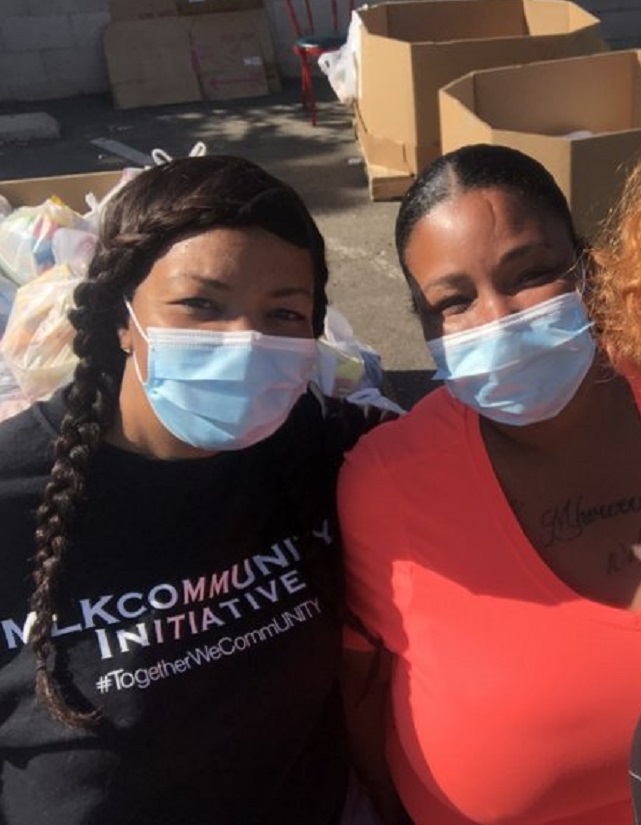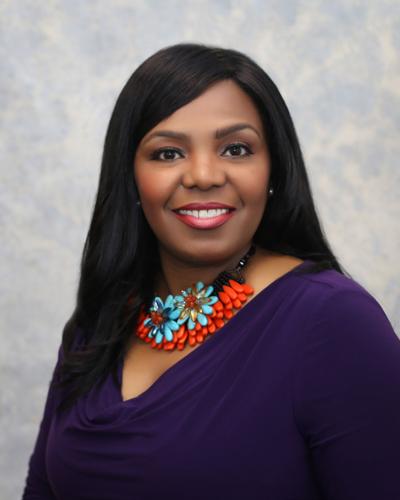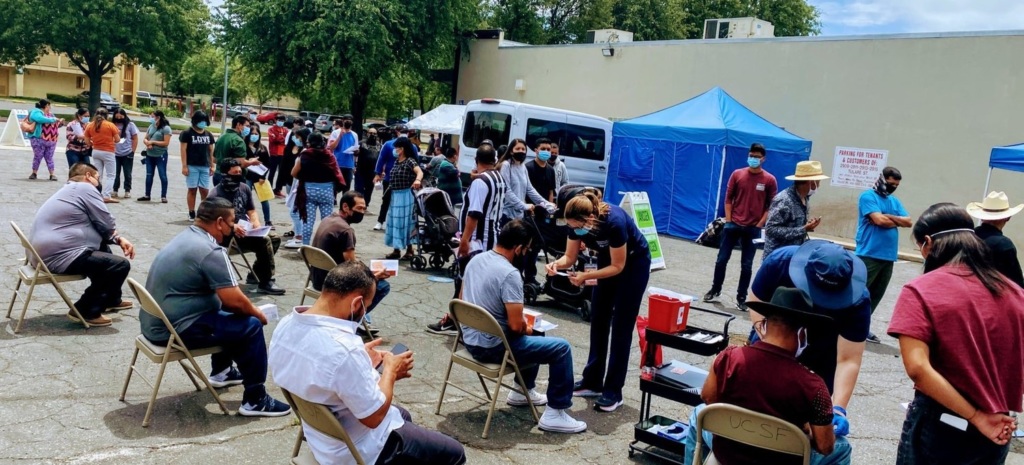Farmworkers, Queer Networks, Black Communities and More: Partnering to Serve Communities in the San Joaquin Valley
Program
-
Focus Areas
Capacity Building & Leadership, Communicable Disease Prevention -
Expertise
Coalition & Network Building -
Strategic Initiatives
COVID-19, Vaccine Access & Equity

In the heart of California, the San Joaquin Valley encompasses almost 10,000 square miles of land, framed by the coastal range to the west and the Sierra Nevada mountains on the east. This vibrant growing area is famously known as America’s “breadbasket” and is one of the world’s most productive agricultural regions. And beyond the thousands of farms and vineyards, the Valley is also home to numerous rapidly growing cities and historic towns within its eight counties. While this unique landscape fosters diversity and community strength, the people in the area also face specific challenges, including a historical lack of health funding, difficulties in outreach in remote and rural areas, and large populations of non-English speaking, undocumented migrant laborers.
Getting attention & support
For Arleana Waller, the founder and leader of MLKcommUNITY, the pandemic further exposed the inequities that already existed in the Central Valley. MLKcommUNITY is an economic development nonprofit serving Kern County and based in Bakersfield, and as its leader, Arleana has seen the challenges of getting resources allocated to the Central Valley, especially to the African American community.

It brings tears to my eyes just thinking about it. We were on the front lines from the beginning of the pandemic, setting up the first testing site in the county and serving the hard-hit African American community. And our greatest challenge was getting funding and support from our government.Arleana Waller
Founder and leader of MLKcommUNITY
The community also holds great strengths, however. “We are resilient and never lose hope,” she said. Throughout the pandemic Arleana and over 40 partner organizations and churches worked tirelessly to take care of their community, distributing over one million pounds of food since March 2020 and sending out trusted messengers to talk to folks about COVID. They reached out directly to Governor Newsom’s office to advocate for Bakersfield to get much-needed resources. At a time when vaccines were in scarce supply, these conversations helped secure 1000 free vaccines in April 2021 to be allocated directly for the southeast part of the city, so they could host the first community vaccine pop-up in the area. It was a joyful and busy event, celebrating this important step in community safety with cheerleaders and a jazz band. MLKcommUNITY and local organizations had canvassed the surrounding neighborhoods days in advance, inviting everyone to come to the event as they were. They emphasized that no appointments were necessary, which was also a critical barrier for many folks for various reasons, ranging from vaccine hesitation to lack of digital access.
“Being a TTH partner helped us get canvassers on the ground, at events and in churches, educating and engaging around health,” Arleana said. By receiving their first significant grant from TTH, MLKcommUNITY was able to build out their work and get the attention of other partners and funders, including a statewide foundation and a District Supervisor. “We’re a community of givers here, we show up for each other,” said Arleana. “We just need to get more government attention to get to true equity.” To date, the organization has collaborated with multiple partners to help over 70,000 people in Kern County get vaccinated.
Being seen & counted
In other parts of the Central Valley, the spread-out, remote nature of the region underscores the need for community representation and support. Near the northern end of the valley, the LGBTQ+ Collaborative in Modesto provides services across 3 different counties: Stanislaus, Merced, and Tuolumne. What started as a small volunteer group to train organizations and agencies in better serving the LGBTQ+ population quickly became the go-to COVID resource for the LGBTQ+ community and is now a registered nonprofit organization with 10 staff members and an advocacy center. “TTH came through with the upfront funding for our COVID work that we needed to stabilize and actually launch as an organization, which just wouldn’t have been possible with reimbursable grants,” said John Aguirre, Executive Director of the LGBTQ+ Collaborative.
John and his team saw a clear need and were able to establish a trusted resource for LGBTQ+ concerns that could reach folks where they were. Their connections and knowledge of the community enabled them to share critical COVID information through support groups, at queer bars, and even through beloved local drag queens.
The areas we serve are pretty spread out, so outreach can be tough, but also very important. Especially in rural communities, when we set up info booths, people are so glad to see us because before, they felt alone. They thought they were the only person in the area of that gender identity or that sexual orientation, and they’re just thrilled to meet someone who sees them and understands them.John Aguirre
Executive Director of the LGBTQ+ Collaborative
The importance of being truly seen goes beyond personal connection and support. True health equity can only be achieved when organizations and government agencies better understand and represent all the populations they serve. As part of that work, John and his team have been advocating for better SO/GI (sexual orientation/gender identity) data collection at their local government level and with other Central Valley organizations. “I want us to be counted,” said John. “I want people to know that we are here, because right now we’re undercounted everywhere and LGBTQ people intersect with every population.”
Translating needs & opportunities
Another widely known but often overlooked population in the Central Valley is farmworkers, who are key to keeping the region and our country running. Of the almost 800,000 farmworkers in the state, a vast majority are immigrants, about 75% are undocumented, and a large portion are from Indigenous communities.
The Centro Binacional para el Desarrollo Indígena Oaxaqueño (CBDIO) has worked for almost 30 years to support the systemically disenfranchised community of Indigenous farmworkers and their families across the Central Valley. Throughout the pandemic, CBDIO provided critical COVID education, financial support, and translation services to thousands of Indigenous families. Far from a heterogenous group, these communities speak many different languages, four main ones and thirteen variants, including Mixtec, Zapotec, Triqui, and Tlapaneco. Frequently, they can’t speak or read Spanish, which means the majority of official communications and information never reach most Indigenous farmworkers. For example, when the government mailed letters about accessing emergency pandemic CalFresh benefits meant to help feed children who could no longer receive free or reduced-price meals during school closures, numerous families could not read them and threw the mailers away, fearing a scam. CBDIO’s staff called around and ensured that folks who qualified were able to get those critical CalFresh dollars.
One of the cruel ironies of the pandemic is that California’s farmworkers were early on labeled as essential and continued to work but were often least able to access the essential services and safety needed to survive the many challenges of COVID-19. While testing and vaccines were made available to the general public, farmworkers faced significant barriers including access to culturally and linguistically centered care. Though there may be funding and good intentions, without translation and a better understanding of how people actually live, these programs don’t reach or serve the people they were meant to help.
I would urge government agencies to try to really understand our diverse communities and the challenges we face.Margarita Santiago Vasquez
CBDIO Madera office
Margarita pointed to the example of the rental assistance programs, and the qualifying requirement to be behind on rental payments. Though many indigenous farmworkers were struggling to pay their rent, they borrowed money to keep their payments on-time for fear of eviction, and therefore could not access the support they needed. Without conferring with community leaders on the ground, government efforts do not match the reality of people’s circumstances.
“If government agencies worked more closely in partnership with CBOs and people from the community, they could create programs that people actually need and can easily access,” said Margarita.
Heart of California
The millions of people who call the 400-mile long stretch of California’s center home face the special challenges of the region with resilience and a deep pride in community. We are proud to support our incredible CBO partners in raising their voices, protecting their people, and advocating for a better future for the Central Valley.

This impact story was first published on the Together Toward Health website.
Work With Us
You change the world. We do the rest. Explore fiscal sponsorship at PHI.
Support Us
Together, we can accelerate our response to public health’s most critical issues.
Find Employment
Begin your career at the Public Health Institute.
